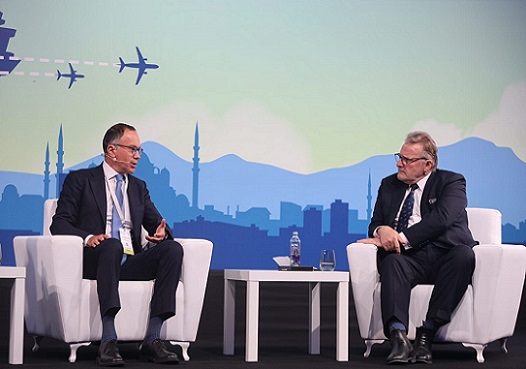ACI EUROPE President puts decarbonisation, air connectivity, and Single Aviation Market at the core of Europe’s competitiveness and cohesion

Istanbul: With Europe at the dawn of a new five-year political cycle, Armando Brunini, ACI EUROPE President and CEO of SEA Milan Airports, today called for European governments to effectively enable aviation decarbonisation while preserving air connectivity — and for the EU to protect and further reinforce the Single Aviation Market. Speaking at the 34th ACI EUROPE Annual Congress and General Assembly in Istanbul, he tackled a wide range of issues ranging from SAF deployment and airports’ green energy needs to airport slots and demand management measures, as well as Air Traffic Management (ATM) reform and innovation.
Green Deal is the only way forward along with air connectivity’s socio-economic benefits
Asked whether the results of the European elections should trigger a change in direction for the EU when it comes to aviation decarbonisation policies, Brunini was adamant in restating the airport industry’s support for the EU Green Deal and Fit for 55: “We have been saying that decarbonisation is for airports the mother of all challenges, and therefore an absolute priority, and we are not going to backtrack on that. Science is unequivocal about where our planet will end up without ambitious and effective climate action — and given that aviation’s emissions are particularly hard to abate, what is at stake for us is nothing less than our license to operate. So the Green Deal and Fit for 55 are the way forward. We re-affirmed that last month, when ACI EUROPE joined a cross-sectorial coalition of more than 500 companies, local entities and NGOs calling for the Green Deal to be confirmed as a strategic priority in the next EU mandate.”
But Brunini was equally insistent that the Green Deal must deliver on its promise to be a growth engine. Referencing ACI EUROPE’s Policy Manifesto launched last January, Brunini pointed to the challenges involved in implementing the EU Fit for 55: “Decarbonisation policies must leave no airport and no community behind. This means we must decarbonise aviation and at the same time preserve the unique socio‑economic benefits of air connectivity — and we must do so in ways that also ensure our competitiveness”.
Brunini then called for urgent additional policy interventions and flexibility mechanisms to address these concerns, with a particular focus on ensuring the availability of cost-competitive Sustainable Aviation Fuels (SAF) — including through:
- An ambitious EU SAF industrial policy encompassing systemic, concrete and effective financial support incentives. While announced SAF production capacity appears largely on track to meet the mandates set by RefuelEU up until 2030, most announced SAF facilities still face many challenges — from raising capital to securing construction permits and commissioning.
- Giving airports the necessary tools to support SAF deployment through the extension of existing flexibility mechanisms beyond 2034 and additional flexible accounting systems (book & claim).
Looking at the future deployment of zero-emission aircraft currently under development, Brunini pointed to the recently published Vision of the EU Industrial Alliance for Zero-Emission Aircraft (AZEA), which estimates that 36% to 68% of intra-EU flights will be operated by hydrogen and electric-powered aircraft by 2050: “Servicing these aircraft on the ground will involve reconfiguring our energy supply, storage, and distribution facilities. This will require both massive investments and access to considerable volumes of green energy. It is essential that these energy and financial needs start being factored in and addressed in energy and transport policies both at EU and national levels — in a fully coordinated way. This is not happening for now — but this is something AZEA has identified as an essential prerequisite. Critically for airports, we must be provided with the financing or regulatory investment levels to support this deployment.”
Single Aviation Market review
Turning to competitiveness, Brunini voiced the airport industry’s long‑time support and reliance on the EU Single Aviation Market and EU Aviation Agreements with neighbouring countries and other across the world: “Along with ensuring cohesion and equality, our Single Aviation Market plays an essential role in supporting the competitive position of the EU globally. Safeguarding its integrity and reinforcing its effectiveness must be the other priority for aviation in the next EU mandate — alongside decarbonisation. This is essential given the capacity challenges we are facing and the impact of structural changes in our aviation market.”
Brunini outlined three critical issues for the Single Aviation Market to remain effective and competitive:
- The revision of the 30-year-old EU Airport Slots Regulation: “With Europe accounting for half of the world’s most congested airports and consolidation set to reinforce the dominance of a few airline groups at larger airports, reforming current airport slot rules is a no-brainer. In fact, these rules will be the defining factor for the competitiveness of the Single Aviation Market in the years to come.”
What is needed is full transparency in the way airport slots are allocated and used, rules that guarantee a more effective use of limited capacity — especially at super-congested airports — along with more effective access to airport slots for new entrants.
- Standing firm on the full freedom of airlines to provide services: “Arbitrary demand-management measures such as flight bans and capacity limitations damage the Single Aviation Market. They should remain exceptional and fully comply with EU rules. In particular, the European Commission must ensure the respect of the Balanced Approach for noise management.”
- Supporting innovation and resilience: “Continued EU financial support for both SESAR1 Research and Deployment in the next EU financial framework is an absolute necessity if we want to deliver better operational efficiency, improved resilience and environmental benefits. Such support is needed considering the failure to achieve meaningful reform of Air Traffic Management through the Single European Sky policy.”
“We also need much more effective support at EU level for the deployment of new technologies, such as advanced security screening systems and biometrics. The recent backtracking on the approval of new cabin bag screening equipment has laid bare the urgent need for a fully integrated EU testing and certification system for aviation security technologies. Similarly, the recommendation of the European Data Protection Board (EDPB) limiting the use of facial recognition solutions by airports and airlines — without even considering existing safeguards and without a proper risk/benefit assessment – is very bad news. It essentially risks stalling a huge improvement in the passenger experience that is being embraced by leading airports elsewhere in European countries and across the world, striking a blow to both the resilience and competitiveness of our industry.”
_____________________
1 Single European Sky ATM Research Project

